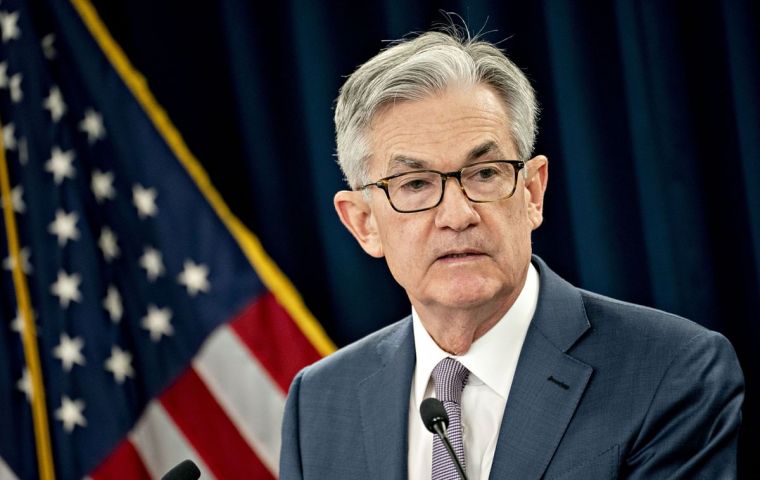MercoPress. South Atlantic News Agency
Fed sees no interest rate hikes likely through 2023; US GDP expected to increase 6,5% in 2021
 Fed chairman Jerome Powell said that along with the increase in GDP, committee members forecast unemployment to fall to 4.5% from its current 6.2% level
Fed chairman Jerome Powell said that along with the increase in GDP, committee members forecast unemployment to fall to 4.5% from its current 6.2% level The Federal Reserve on Wednesday sharply ramped up its expectations for economic growth but indicated that there are no interest rate hikes likely through 2023 despite an improving outlook and a turn this year to higher inflation.
As widely expected, the policymaking Federal Open Market Committee also voted to keep short-term borrowing rates steady near zero, while continuing an asset purchase program in which the central bank buys at least US$120 billion of bonds a month.
The key changes came in how central bankers view the economic road ahead and what impact that could have on policy.
“Following a moderation in the pace of the recovery, indicators of economic activity and employment have turned up recently, although the sectors most adversely affected by the pandemic remain weak. Inflation continues to run below 2%,” the committee said in its post-meeting statement.
Stocks reacted positively to the news, with the Dow Jones Industrial Average up more than 200 points while longer-duration government bond yields stayed positive.
Gross domestic product is expected to increase 6.5% in 2021 before cooling off in later years, according to quarterly economic projections from members of the Federal Open Market Committee. That median estimate represents an improvement from the anticipated 4.2% gain during the last round of projections in December.
Projections for 2022 and 2023 are for gains of 3.3% and 2.2% respectively, before growth settles into a longer-term range of 2.3%
Along with the increase in GDP, committee members forecast unemployment to fall to 4.5% from its current 6.2% level. That compares with a 5% FOMC estimate in December. Forecasts for the subsequent two years are for 4.2% and 3.7% before settling into a longer-run level of 4%.
Expectations for core inflation moved higher, with the committee now looking for a 2.2% gain this year as measured by personal consumption expenditures. That is estimated to fall to 2% in 2022 and then edge higher to 2.1% the following year, with the long-run expectation at 2%.
As to how those improvements will move the needle on policy, the committee still expects benchmark interest rates to remain unchanged through 2023.
Fed Chairman Jerome Powell said he expects that inflation will rise this year due in part to soft year-over-year comparisons from the early days of the Covid-19 pandemic in early 2020. However, he said that won’t be enough to change a policy that seeks inflation above 2% for a period of time if it helps to achieve full and inclusive employment.
“I would note that a transitory rise in inflation above 2% as seems likely to occur this year would not meet this standard,” Powell said.




Top Comments
Disclaimer & comment rulesCommenting for this story is now closed.
If you have a Facebook account, become a fan and comment on our Facebook Page!